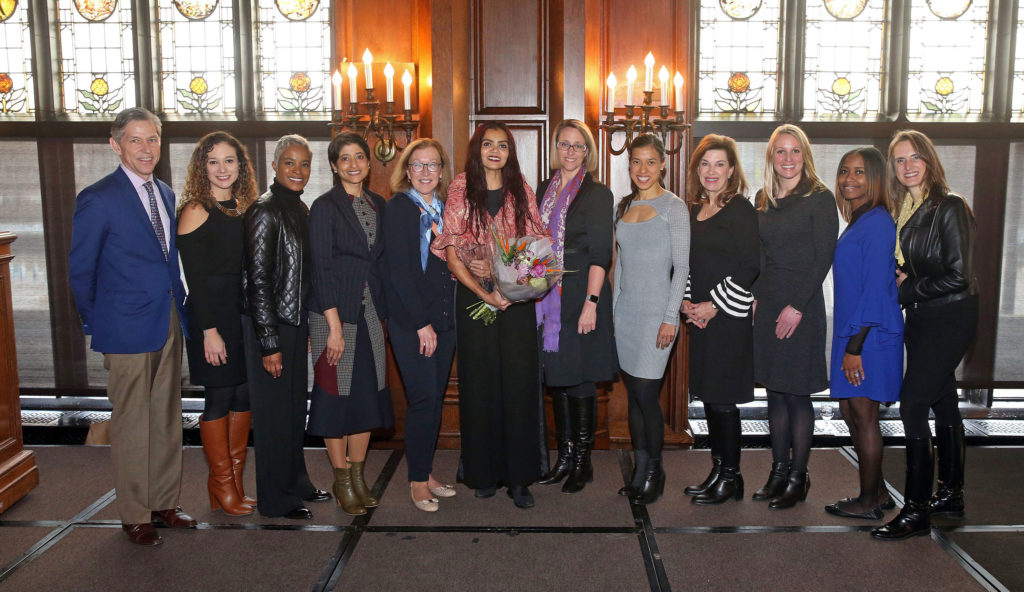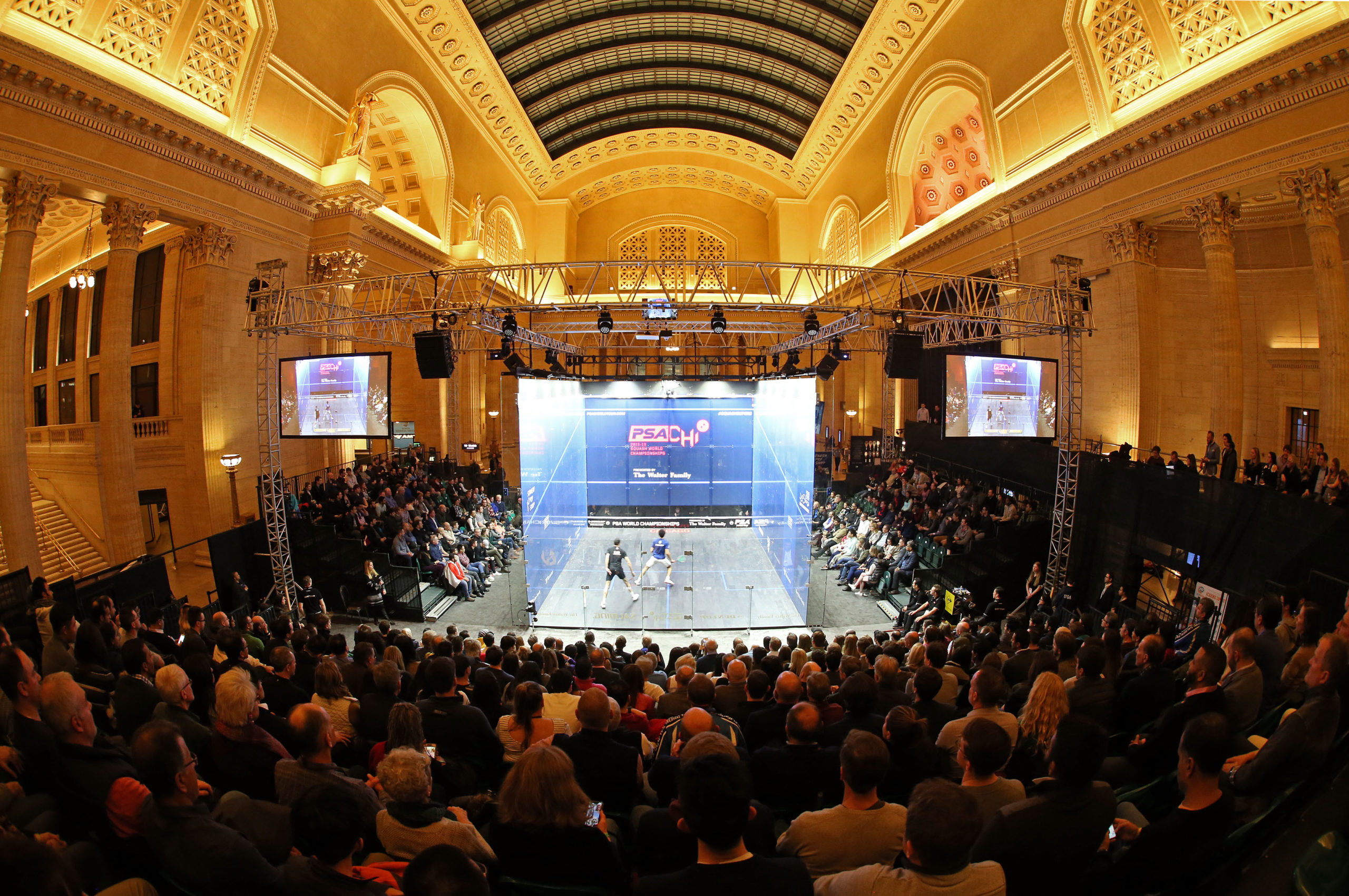By James Zug
One million. Never in the century-plus history of professional squash had a single tournament offered a seven-digit prize money purse.
In the recent past, there had been a smattering of events that upped earnings to record heights (the 2007 men’s and women’s Kuwait Open totaled $250,000; the 2010 men’s World Open in Saudi Arabia reached $327,500). Then the February 2018 edition of the Windy City Open put clarity to the question about the most lucrative event in history, when it offered a $500,000 purse, with prize money parity.
The 2018-19 PSA Squash World Championships presented by the Walter Family doubled it to $1 million. Each winner was guaranteed the largest paycheck in history.
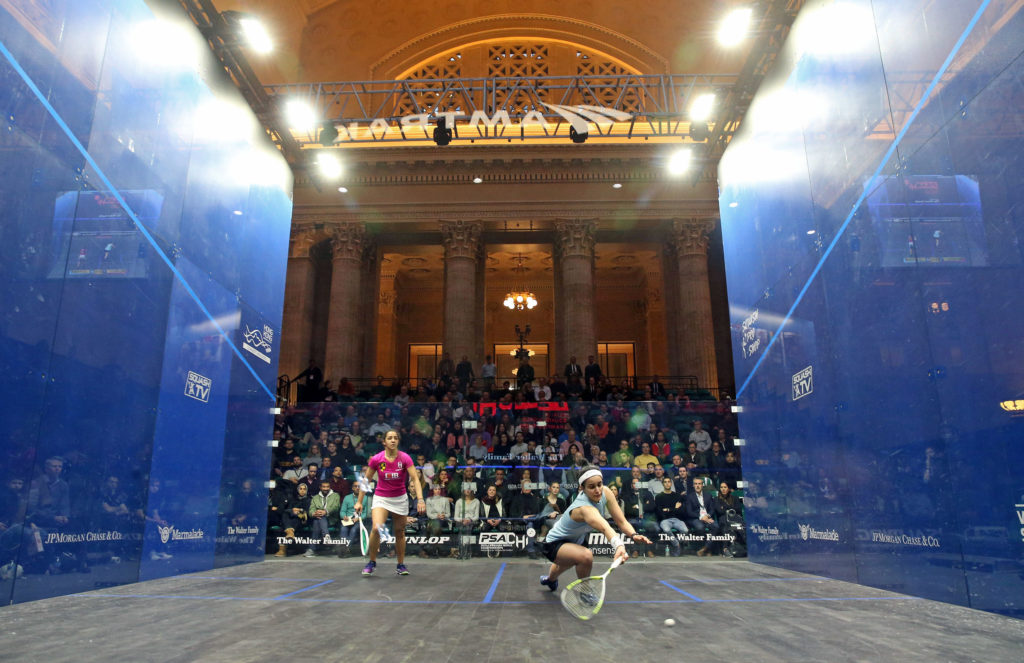
It is no evanescent one-off. Mark and Kimbra Walter have contracted for four more $500,000 Windy City Opens and four more $1 million World Championships over the next eight years, through 2027. The family is active in philanthropy, in particular with MetroSquash, Chicago’s urban program; and Mark Walter, the head of Guggenheim Partners, a global financial service firm, is the lead owner of the Los Angeles Dodgers. “For Chicago, this was our first world championships,” Mark Walter said after the final. “We thought it was fantastic. It is going to be here every two years for years to come. For our family, it is such a joy to watch these players. All of them are incredible. They are incredible at their craft, and I also think they are incredible human beings—that is what makes this sport so special.”
This year’s edition was superlative beyond the prize money. It was the largest squash tournament in the world in terms of credentials (295 issued) and in terms of reach: not only were the matches streamed on SquashTV but also on Facebook Watch, as the World Championships were the first squash event on Facebook’s video-on-demand site. More than fifty thousand people viewed the quarterfinals on Facebook Watch.
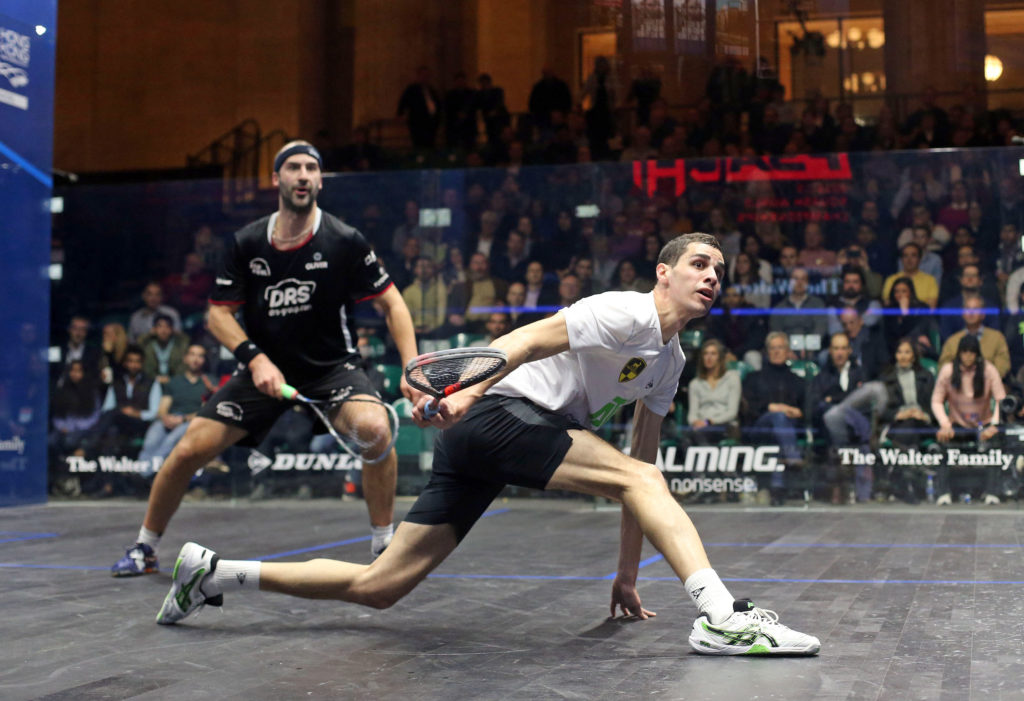
A combined world championship is a very unusual occurrence. Despite the fact that the World Squash Federation has sponsored a world championship for over forty years, a joint men’s and women’s event has happened only twice before, in Rotterdam in 2011 and in Manchester in 2017. With 128 players, the amount of stochastic stopping and chatting in the lobby near the elevators at the Palmer Hotel, the tournament hotel, was stupendous. Despite the Palmer’s history as once being the largest hotel in the world, it felt like every pro you knew in squash was jammed into the same elevator. I counted twenty-four different nationalities in the two draws.
A gargantuan first day of the tournament staged sixty-four first-round matches on eight courts at three venues. Three of the courts were on the eleventh floor of the University Club, with lovely views of Lake Michigan (when it wasn’t raining or snowing) and just two floors above where the Windy City Open is usually staged in the club’s Cathedral Hall.
Four of the courts were at the innovative Hussain MetroSquash Academic & Squash Center on Chicago’s South Side. It was the first time a world championship had been hosted by an urban squash program. There were two sets of side-by-side courts across a short spectator space from each other—you could watch all four just by swiveling your head. At one point that day, two of the four matches on court were both at 8-8 in the fifth at the same moment. The ultimate dilemma: which match do you watch? The only spectator not swiveling their head was Angus, MetroSquash’s teacup Yorkshire terrier and perennial prowler of the galleries. “It was an honor to host two days of the World Championship at the Hussain MetroSquash Center,” said executive director David Kay. “We were able to open our doors and provide free access to students, families and the South Side community. For people to have the opportunity to see the game at the highest level was a great gift, and we are grateful to the Walter family for making this exceptional event a reality.”
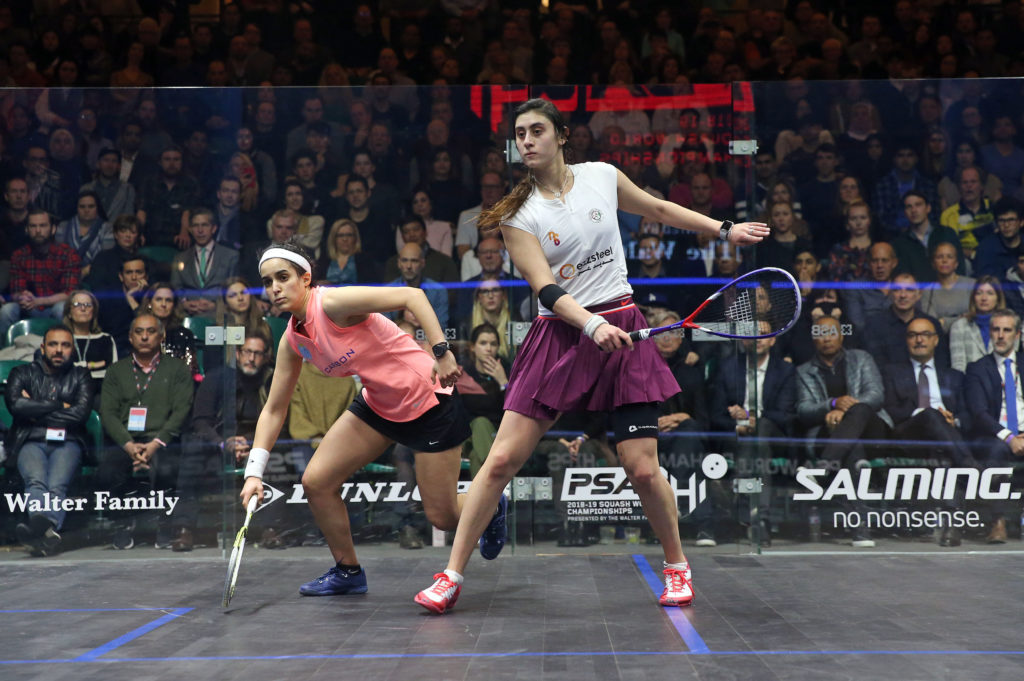
The setting for the ASB GlassCourt (with new lights and a new floor) was Union Station. Built almost a century ago, the iconic train station is the fourth-busiest in the country, with about 140,000 travelers passing through it each day. It presents a similar profile to the venerable J.P. Morgan Tournament of Champions in another train station, Grand Central Terminal. (The architect of Union Station, Daniel Burnham, also designed the Flatiron Building in New York and another Union Station, the famous Washington, DC terminal.) The court was set up in the Great Hall, the main waiting room in Union Station. It had just finished receiving a massive $22 million renovation in December and elicited oohs and ahhs from every new visitor, with a football-field-long curved skylight that stands a lob-swallowing 115 feet above the floor.
The World Championships were the first time the station had ever hosted a sporting event, and not everything went exactly perfectly. A sizable Amtrak kiosk blocked the view of the court for many passersby (it will be moved later this year). Another double-edged sword was the interactiveSQUASH front wall. It blocked visual access from behind the front wall—no camping out for prime standing spots like you see in Grand Central. But for those in the 500-person stands, it was a quantum leap in entertainment. The front wall streamed replays, statistics and sponsor content. Kids loved playing on the court during breaks when the wall streamed video games like Space Invaders. Selected fans won the right to serve at the start of the match by throwing or hitting balls at flashing targets on the wall.
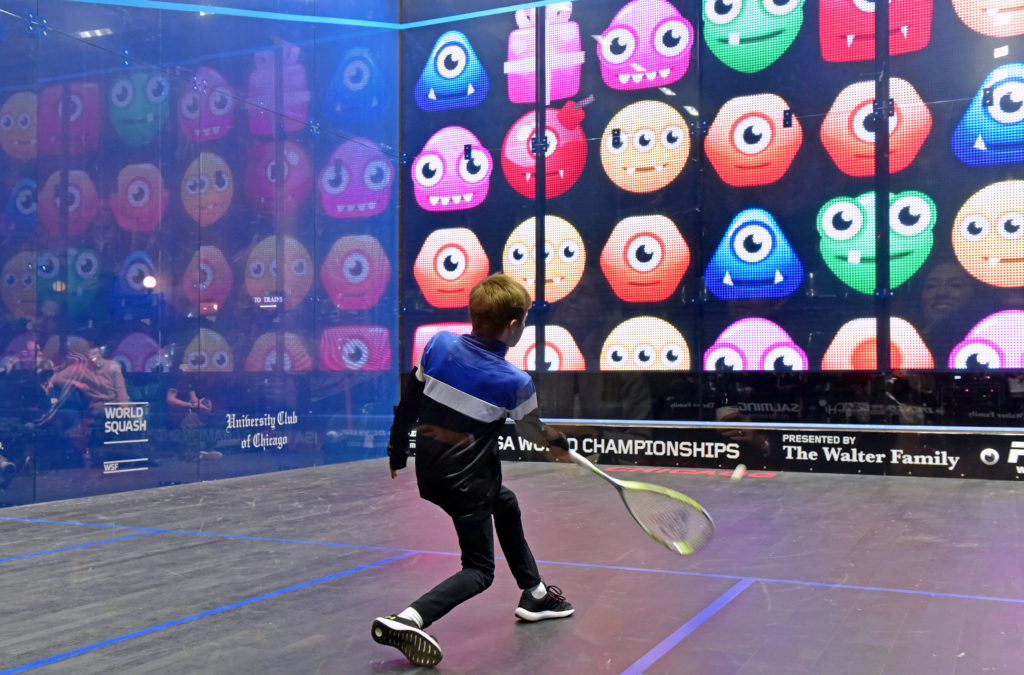
“I’m proud of the Chicago squash community’s collaboration with the PSA to host this showcase event,” said John Flanigan, the University Club of Chicago’s Athletic Director, Windy City Open Director and leader of the Chicago operations for the World Championships. “We learned a lot this first year and are already excited about making the next World Championships in Chicago even better. Union Station was a great partner, and we hope to return here in future years. The Walter family remains big fans of pro squash—it was great to see them here so often and their support of MetroSquash is significant. I’m thankful for the world’s top squash professionals: their amazing athleticism is matched by their professionalism and great personalities.”
The stands were packed for the latter stages of the event, but one fan in particular stuck out. Esari Karppinen, last spotted five years ago at the U.S. Open, returned for his second pro tournament. The Finnish electrician watched every match on every day, usually from his trademark right side gallery.
With 126 matches over eight days, there were bound to be some superlative squash for Karppinen and the rest of the audience. Egyptian hegemony was obvious. Sixteen Egyptians made it into each draw; half of each quarters was Egyptian and four Egyptians contested both finals.
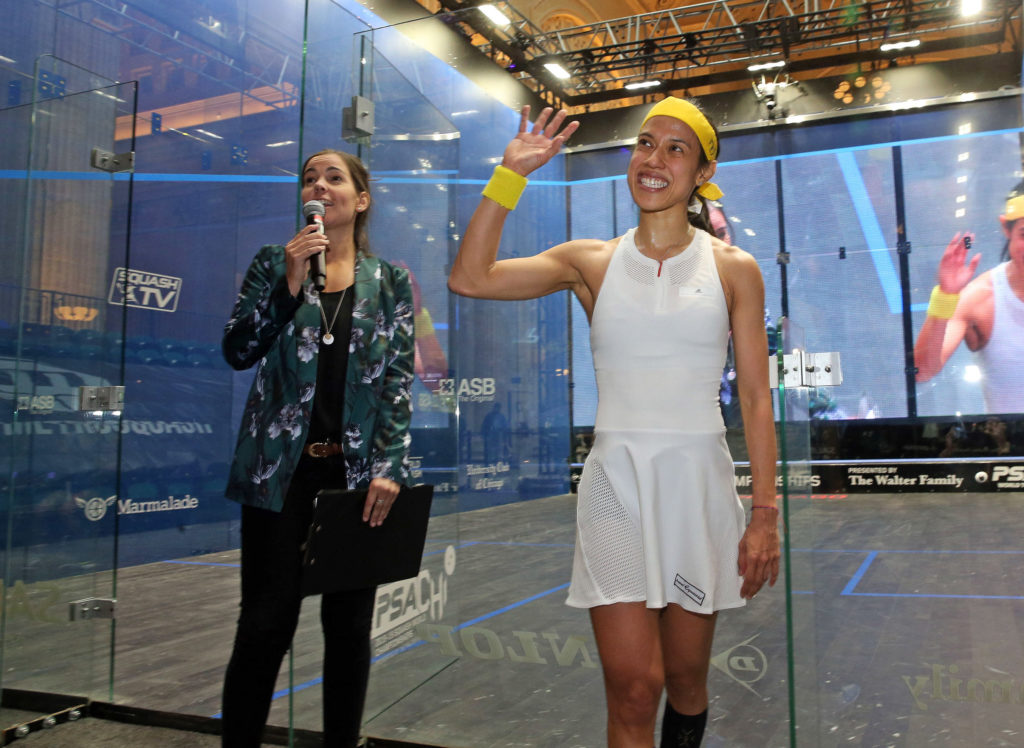
Some first-round thrills: Melissa Alves knocked out Sam Cornett in four games, three of which went to overtime. Mostafa Asal, world junior champion, won a five-gamer in the first round over Peter Creed, lost quickly to Ali Farag in the next round but decided to stay around and spend the rest of the week watching matches and observing how the best players prepare. Ben Coleman overcame Max Lee in a ninety-one-minute match with four of the games decided by two points. The upset of the opening day was probably Youssef Soliman bashing past former world champion Karim Abdel Gawad in a rancorous 11-9 in the fifth battle royale.
Two veteran v. youth matches in the second round were of particular interest. Joelle King outlasted Mayar Hany in a blistering five-gamer with three overtime games. They were eight years apart in age. James Willstrop and Victor Crouin doubled that. It got a bit stroppy, with the wily thirty-five-year-old Willstrop hanging on as the nineteen-year-old Crouin pressed. In the next round, Willstrop was again uncharacteristically churlish and offered a lot of conversation with his opponent Miguel Angel Rodriguez.
For America, there was encouraging progress. Olivia Fiechter battled hard in a four-game loss to Millie Tomlison that included a 24-22 first game. Haley Mendez hung around Zeina Mckawy for forty minutes in a four-game loss. Todd Harrity snagged a game against eventual finalist Tarek Momen. Two Americans made it beyond the first round: Olivia Blatchford Clyne survived a North American barnburner against Canada’s Hollie Naughton, 11-6 in the fifth, only to face her Team USA teammate Amanda Sobhy. After beating Blatchford Clyne, Sobhy dashed to a 2-1 lead against Nour El Sherbini, with an emphatic 11-4 trouncing in the third game, stinging the ball with venom, but she couldn’t hang on and lost in five.
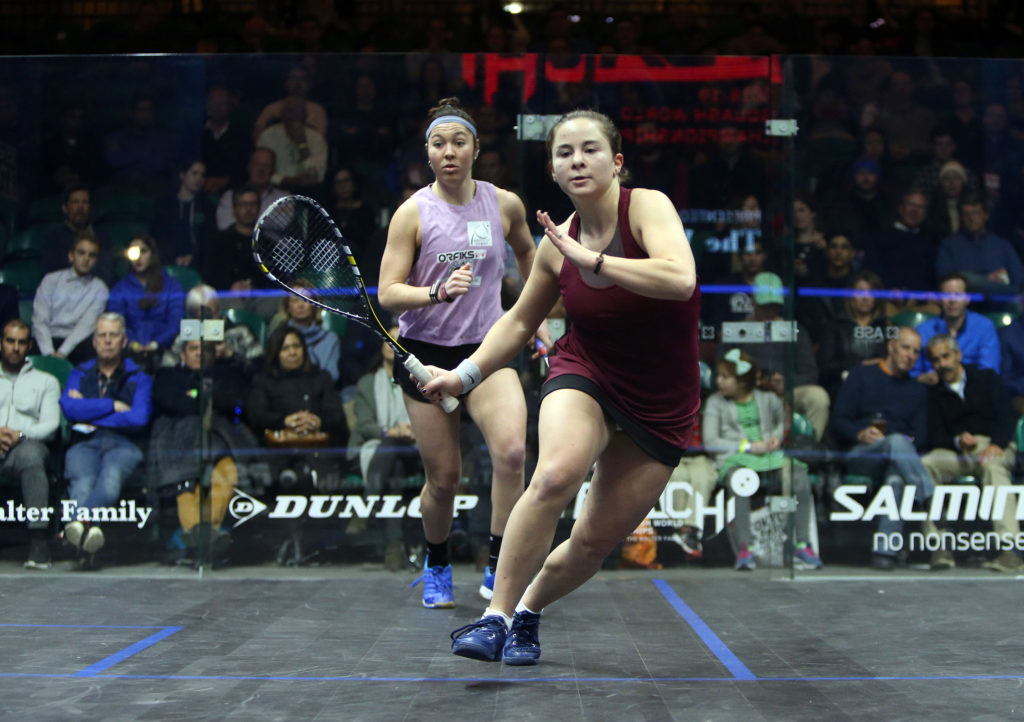
El Sherbini struggled in a magnificent semis against Camille Serme, but in the final—her fifth adult world championship final on top of four junior ones—she was the cooler, calmer hand. Nour El Tayeb was edgier. She had come through a brutal semifinal against defending champion Raneem El Welily, 12-10 in the fifth, taking the victory on her third match ball. In the final, she grabbed the third game from El Sherbini, saving a championship ball. The fourth game was absolutely riveting. El Tayeb squandered three game balls (one on a fifty-three-shot rally that ended with a top-of-the-tin volley error) and saved one more championship ball before letting El Sherbini off the hook.
Last year I was asked by the PSA to come up with my top five all-time greatest men and women players. The two players in Chicago that I listed were Nicol David and Nour El Sherbini. For David, who lost in the third round to Serme, it was her sixteenth and last World Championship. No one imagines that El Sherbini might break all of David’s records, but the Egyptian only turned twenty-three last November. She’s just a few months older, with three World Championship titles under her belt, than David was when she won her first. El Sherbini is already fifth all-time for women in months at world No.1 and number of world titles.
Much like thirty years ago when it was considered impossible to beat both the Khans, Jahangir and Jansher, in the same tournament, it is becoming similar with the El Shorbagy brothers, Mohamed and Marwan. Tarek Momen pulled off the unprecedented double in Chicago, easily outpointing Marwan in the quarters and then grinding through a 11-8 in the fifth victory over the defending champion Mohamed in the semis. It was the first time Momen had beaten Mohamed in seven years.
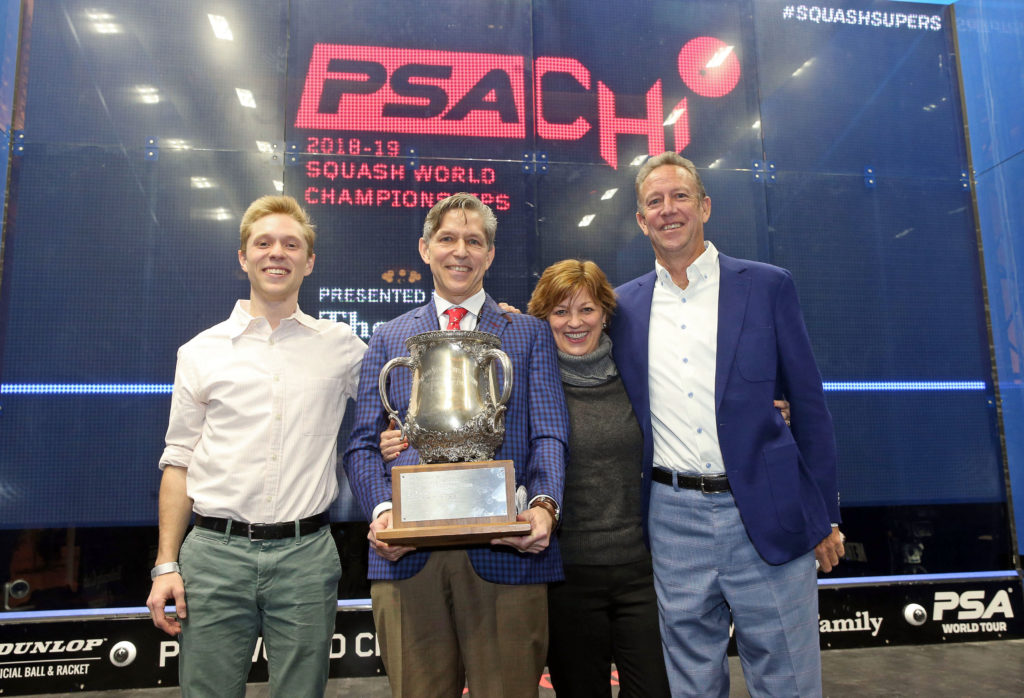
In the final, Momen hung tough with Ali Farag, and over the first three games it looked like it could go either way. Farag tinned two straight balls midway through the second game. “The fact that they were the right shots to play but clipped the top of the tin made me nervous and so from that point onwards I turned ever so slightly passive,” he told me afterwards. “It was not a tactic I walked on court with, but given the occasion and the nerves, I was ready to fall to that Plan B of elongating the rallies.” Farag then contained and absorbed pressure, a defensive, attritional style, almost rope-a-doping like Muhammed Ali.
In the third game, Momen saved three games balls but Farag eventually claimed the game 13-11. In the fourth, Momen was out of gas and Farag, his tactics proven correct, hopped away 11-3 to take his first world title. Five years ago he was an undergraduate at Harvard. Now he is a world champion and the number one ranked man in the world.
Eight players got treated to #SquashSupers status in the program with their own super hero persona. Farag, still without a nickname beyond a tentative “Mr. Fantastic,” was not one of them. It’s a different story in Egypt. When Farag’s flight arrived back in Cairo, the CEO of the Egyptian Squash Federation was standing at the airplane door to greet him, and a large group of friends and his parents and brother were in the gate area, waiting for the new squash super hero.
